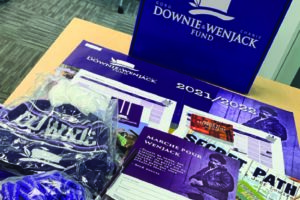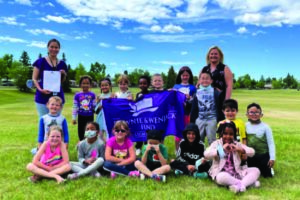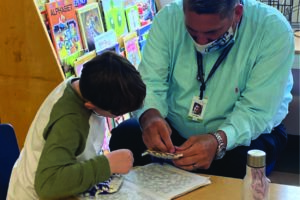This blog post was written by Rebecca Hope, Legacy Schools Coordinator, Gord Downie & Chanie Wenjack Fund
“Chanie haunts me. His story is Canada’s story. This is about Canada. We are not the country we thought we were.”
Gord Downie
On today’s National Day of Truth and Reconciliation, how can educating youth about the true history of residential schools in Canada benefit future reconciliation efforts?
September 30, 2021, marks the inaugural National Day for Truth and Reconciliation. This federal statutory holiday answers call #80 of the Truth and Reconciliation Commission’s 94 calls to action. It is a day of reflection to commemorate and honour the Survivors, their families and communities, and the children who died as a result of the residential school system that existed in Canada until 1996.
Like many Indigenous people, I grew up with knowledge of my Algonquin ancestry but did not know what it meant. My family was disconnected from our Indigenous culture and history. It wasn’t until university, when I learned about colonization and the truth about residential schools, that I recognized the hardships my ancestors faced for me to be here. I believe I would have begun claiming my Indigenous identity much earlier on in life, to honour them, if I had learned about the true history of residential schools in primary and secondary school.
The Gord Downie & Chanie Wenjack Fund’s Legacy Schools program is a free national initiative to engage, empower, and connect students and educators to further reconciliation through awareness, education, and action. Schools and educators are provided with free toolkits and resources – everything needed to confidently teach students about reconciliation and the true history of Indigenous Peoples and residential schools.
The Legacy Schools toolkit is full of helpful of resources to help aid educators and students on their reconciliation journey.
Incorporating this education into classrooms provides youth the opportunity to learn about Indigenous history, culture, and the truth about residential schools with materials they can be confident were properly vetted by our Educator Advisory Committed; a group of dedicated First Nations, Inuit, Métis, and non-Indigenous educators. Not only can these resources help empower Indigenous youth to take pride in their identity, they provide Indigenous and non-Indigenous educators a foundation to join the movement towards reconciliation, by inspiring the next generation of youth to take reconciliACTIONs.
ReconciliACTIONs are meaningful actions that move reconciliation forward. They aim to bring Indigenous and non-Indigenous peoples together to create awareness, share and connect, and to learn the truth. They are a catalyst for important conversations and meaningful change, recognizing that change starts with every one of us.
Many of the nearly 3,000 Legacy School participants have answered Gord Downie’s call to “Do Something” by taking reconciliACTION. Here are just a few examples:
James Short Memorial School, AB
Every year during Secret Path Week (Oct. 17-22), the week we honour the legacies of Gord Downie and Chanie Wenjack, Legacy Schools across Canada participate in local Walks for Wenjack. The goal of a Walk for Wenjack is to collectively walk the 600km Chanie needed to travel when he escaped residential school to return home.
Kindergarteners at James Short Memorial School in Alberta worked hard, doing laps around their dry pond with their teacher every day, to complete their Walk for Wenjack with a goal of 900km! Despite the pandemic making it hard for them to complete laps together, they did it! Students were inspired to reach their goal to honour Chanie and his courage.
Lynnmour Xá7elcha Elementary School, BC
Lynnmour Xá7elcha staff and students embraced the opportunity to be a Legacy School. They brought traditional knowledge into the classroom to learn more about the Skwxwú7mesh and Səlilwətaɬ peoples, whose traditional lands they live and learn on.
They also embarked on a weaving project, where every person in the school learned about traditional weaving, then used that gifted knowledge to weave their own quarter bags. Quarter bags are an important item that is still used in ceremonies, and weaving is an important skill that has provided clothing, blankets, mats, and other important survival and cultural tools for the Skwxwú7mesh and Səlilwətaɬ peoples.
A display of weavings was created to remind everyone that respecting and embracing traditional knowledge of Indigenous Peoples is highly valued at Lynnmour Xá7elcha.
Building a Path Towards Reconcilliation
The Legacy Schools program fills a void that many Indigenous and non-Indigenous people in Canada lacked in their education: an opportunity to learn the truth about Canada’s history and to honour the experiences of Indigenous communities which have often been ignored. People in Canada will no longer be able to say ‘I had no idea this happened’ when the news of recovered bodies at former residential school sites breaks on the news. This will forever be a part of our collective identity and together, through the National Day for Truth and Reconciliation and by participating in programs like the Legacy Schools program, we can begin to build a path towards reconciliation.
On September 30 and throughout the year, we ask all people in Canada – What will you do to further reconciliation and make change in your community?
Learn more and make a donation in support of the Gord Downie & Chanie Wenjack Fund today. Visit downiewenjack.ca to learn more.




One Response to “The Legacy Schools Program: A Path to Make Change”
Jill Kruse
The story of Chanie brought to focus through the conscious efforts of his family and musician Gord Downie was the spark which has moved me to seek to understand the struggles of our indigenous people and how our white culture did so much harm. Please accept his small gift from a teacher and journalist who wants to further my learning journey through supporting your organization of education.
•